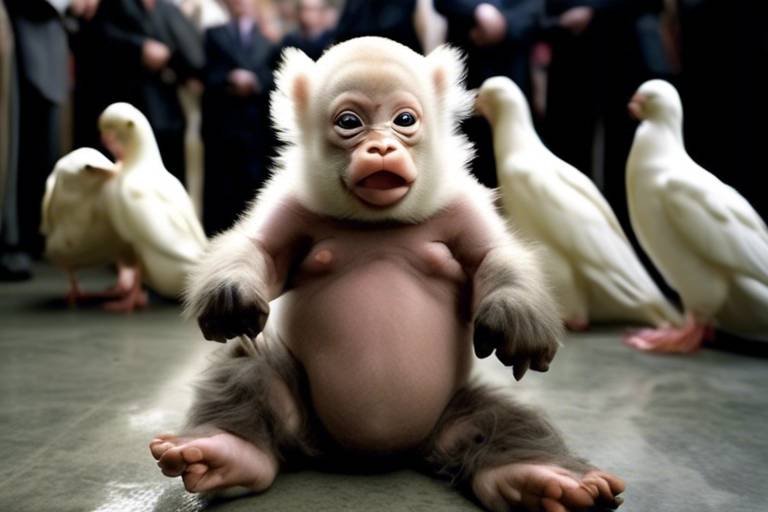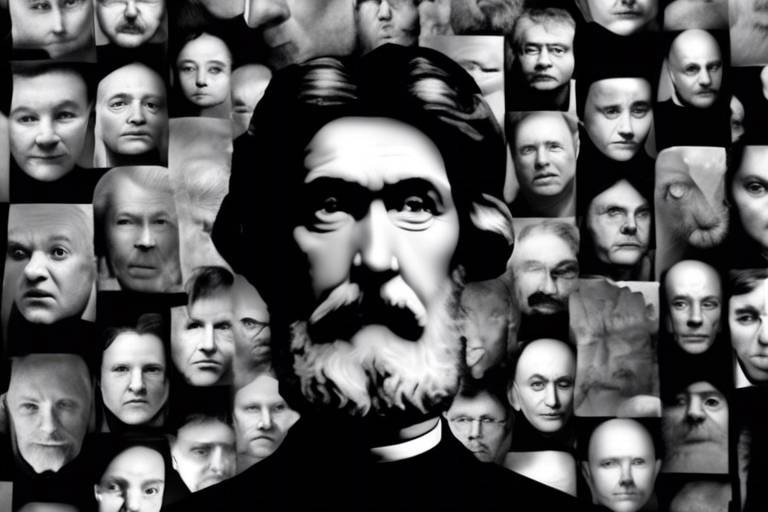The Politics and Philosophy Behind Animal Rights
In our ever-evolving society, the debate surrounding animal rights has gained considerable traction, intertwining with both political ideologies and philosophical inquiries. At its core, the discussion prompts us to question not only how we treat animals but also what it means to coexist with them in a world that often prioritizes human interests. The intricate relationship between politics and philosophy in the realm of animal rights challenges us to reflect on ethical considerations, historical contexts, and the movements that advocate for the welfare of animals.
Historically, the treatment of animals has varied dramatically across cultures and epochs. From ancient civilizations that revered certain species to modern societies that exploit them for various purposes, our understanding of animal rights has been shaped by a myriad of factors, including religion, culture, and economic needs. This evolution is not merely a reflection of changing societal norms but also a manifestation of deeper philosophical questions about the moral status of animals and our responsibilities towards them.
As we delve into the philosophical theories that underpin animal rights, we encounter diverse perspectives that challenge us to rethink our ethical frameworks. For instance, utilitarianism posits that the morality of an action is determined by its outcomes, urging us to consider the balance between human interests and animal welfare. This perspective raises critical questions: Should the happiness of animals be weighed against human benefits? Can we justify animal suffering for the sake of progress?
On the other hand, deontological ethics presents a contrasting viewpoint, emphasizing the inherent rights of individuals, including animals. This approach argues that animals possess rights that must be respected, irrespective of the consequences. Such a stance has significantly influenced legal frameworks and animal protection laws, sparking debates about the moral imperatives that underlie our treatment of non-human beings.
Legislation plays a crucial role in shaping the landscape of animal rights. Various laws and regulations have been enacted worldwide to protect animals, reflecting the evolving societal values and ethical considerations in political discourse. However, the effectiveness of these laws often hinges on their enforcement, which presents numerous challenges. Systemic issues, such as inadequate resources and public awareness, can undermine the implementation of animal welfare legislation, leaving vulnerable species at risk.
As we explore the global perspectives on animal welfare laws, we uncover disparities in legal protections and societal attitudes towards animals. Some countries have made significant strides in enacting comprehensive animal welfare legislation, while others lag behind, often prioritizing economic interests over ethical considerations. This dichotomy raises pertinent questions about the universality of animal rights and the moral obligations we hold towards sentient beings across the globe.
In conclusion, the politics and philosophy behind animal rights is a multifaceted issue that demands our attention and action. By engaging with these complex ideas, we can foster a more compassionate and ethical society, one that respects the rights of all living beings. As we continue to navigate this landscape, it’s essential to remain informed and advocate for policies that prioritize animal welfare, ensuring that our actions reflect our values.
- What are animal rights? Animal rights refer to the idea that animals deserve to live free from human exploitation and harm, similar to the rights afforded to humans.
- Why is legislation important for animal rights? Legislation is crucial as it establishes legal protections for animals, ensuring they are treated ethically and humanely.
- How do philosophical theories influence animal rights? Philosophical theories provide frameworks for understanding our moral obligations towards animals, shaping public opinion and policy decisions.

The Historical Context of Animal Rights
Understanding the roots of animal rights is like peeling back the layers of an onion; each layer reveals a deeper understanding of how our perceptions of animals have evolved over time. From ancient civilizations to modern society, the treatment and consideration of animals have been influenced by a myriad of cultural, philosophical, and political factors. In ancient times, animals were often viewed through a lens of utility, serving primarily as sources of food, labor, or companionship. However, as humanity progressed, so did our understanding of the intrinsic value of these beings.
In the early philosophical debates, thinkers like Plato and Aristotle laid the groundwork for how humans might consider non-human animals. Plato, for instance, suggested that animals were lower beings, lacking the rationality of humans. In contrast, Aristotle recognized a hierarchy of living beings but still acknowledged that animals could experience pain and pleasure, hinting at a moral consideration. Fast forward to the Enlightenment period, and we see a shift in thought. Philosophers such as Immanuel Kant argued that while animals do not possess rationality, they should still be treated with respect because they are capable of suffering.
The 19th century marked a significant turning point in the animal rights movement. The establishment of the first animal welfare organizations, such as the Royal Society for the Prevention of Cruelty to Animals (RSPCA) in 1824, signaled a growing recognition of the need to protect animals from cruelty. This period also saw the emergence of influential thinkers like Jeremy Bentham, who famously asked, "The question is not, Can they reason? nor, Can they talk? but, Can they suffer?" This pivotal question laid the foundation for the modern animal rights movement, emphasizing that the capacity for suffering should dictate how we treat animals.
The 20th century introduced a more organized and vocal advocacy for animal rights, with the publication of critical texts like Peter Singer's "Animal Liberation" in 1975. Singer's work ignited a global conversation about the ethical treatment of animals, challenging the status quo and urging society to reconsider its moral obligations. His utilitarian approach argued that the interests of all sentient beings should be considered equally, regardless of species. This was a radical departure from the anthropocentric views that had dominated Western thought for centuries.
Today, the historical context of animal rights continues to evolve, influenced by advances in science, changes in cultural attitudes, and ongoing advocacy efforts. The rise of the internet and social media has further amplified these discussions, allowing for a broader dissemination of information and mobilization of support for animal welfare. However, despite these advancements, the struggle for animal rights is far from over. Many animals still face significant threats from habitat destruction, industrial farming, and exploitation in entertainment.
As we reflect on the historical context of animal rights, it's essential to recognize that this journey is not merely a timeline of events but a complex interplay of ideas, ethics, and activism. The ongoing dialogue about how we treat animals is a testament to our evolving moral landscape, and it challenges us to consider our responsibilities as stewards of the planet.
- What is the main purpose of animal rights? The main purpose of animal rights is to ensure that animals are treated with respect and dignity, protecting them from suffering and exploitation.
- How have historical perspectives shaped modern animal rights? Historical perspectives have laid the groundwork for contemporary ethical debates, influencing laws and societal attitudes towards animal welfare.
- What role do organizations play in advocating for animal rights? Organizations like the RSPCA and PETA work to raise awareness, lobby for better laws, and provide resources for animal protection efforts.

Key Philosophical Theories
The discussion surrounding animal rights is deeply rooted in various philosophical theories that offer unique perspectives on the moral status of animals. These theories not only shape our understanding of animal welfare but also influence the policies and laws that govern our treatment of animals. Among the most significant of these theories are utilitarianism, deontological ethics, and virtue ethics. Each of these frameworks provides a different lens through which we can examine our obligations towards animals and the ethical considerations that arise from our interactions with them.
Utilitarianism is perhaps the most widely discussed theory in the context of animal rights. This approach evaluates the morality of actions based on their consequences, specifically the overall happiness or suffering they produce. Think of it as a balancing act: on one side, we have the interests of humans, and on the other, the welfare of animals. The challenge lies in determining how to weigh these interests against one another. For instance, if a particular policy benefits a large number of people but causes significant suffering to animals, a utilitarian perspective would prompt us to consider whether the benefits truly outweigh the costs. This leads to important discussions about how we can reform policies to better account for animal welfare.
When we delve deeper into the utilitarian perspective, we must consider two key factors: animal suffering and animal happiness. Utilitarianism posits that the moral worth of an action is determined by its impact on these two factors. For example, if a new farming practice significantly reduces the suffering of livestock while still providing a decent yield for farmers, it could be seen as a morally preferable option. This focus on outcomes can drive significant changes in legislation and public policy, pushing for reforms that prioritize animal welfare.
Utilitarianism's emphasis on suffering and happiness has led to a growing movement advocating for the humane treatment of animals in various sectors, including agriculture, entertainment, and research. By highlighting the capacity of animals to experience pain and joy, utilitarian arguments have successfully brought attention to the plight of many species. However, the challenge remains: how do we measure suffering and happiness accurately? This question is at the heart of ongoing debates within both philosophical and political spheres.
Despite its popularity, utilitarianism is not without its critiques. One major concern is its potential to overlook individual rights in favor of the greater good. For instance, if sacrificing one animal could save many others, a strict utilitarian might argue that the sacrifice is justified. Critics argue that this perspective can lead to a slippery slope where the rights of individuals, particularly those of vulnerable species, are easily dismissed. This has prompted many to seek alternative ethical frameworks that place greater emphasis on the intrinsic rights of animals.
Deontological ethics, in contrast, focuses on the inherent rights of individuals, asserting that animals possess rights that must be respected regardless of the consequences. This framework argues that certain actions, such as harming animals for entertainment or food, are inherently wrong, regardless of the potential benefits to humans. Deontological ethics has influenced various legal frameworks and animal protection laws, advocating for a moral obligation to treat animals with respect and dignity.
In summary, the philosophical theories surrounding animal rights are complex and multifaceted. From the consequentialist approach of utilitarianism to the rights-based framework of deontology, each theory offers valuable insights into our ethical responsibilities towards animals. As we continue to navigate the intricate relationship between politics and philosophy in the realm of animal rights, these theories will undoubtedly shape the future of animal welfare legislation and advocacy.
- What is the main idea behind utilitarianism in animal rights? Utilitarianism focuses on the consequences of actions, evaluating their moral worth based on the overall happiness or suffering they produce.
- How does deontological ethics differ from utilitarianism? Deontological ethics emphasizes the inherent rights of individuals, arguing that certain actions are morally wrong regardless of their consequences.
- Why is measuring animal suffering and happiness challenging? Accurately assessing suffering and happiness involves subjective experiences that are difficult to quantify, leading to complex ethical debates.
- What role do these philosophical theories play in legislation? Philosophical theories influence the development of laws and policies by shaping public opinion and ethical standards regarding animal treatment.

Utilitarian Perspectives
Utilitarianism, a philosophical theory that champions the greatest good for the greatest number, offers a compelling lens through which to view animal rights. At its core, this perspective evaluates the moral worth of actions based on their outcomes. For instance, when considering policies that affect both human and animal populations, utilitarianism prompts us to weigh the benefits and harms to all parties involved. This raises an important question: Should the happiness of animals be prioritized alongside that of humans in our decision-making processes? The tension between human interests and animal welfare becomes a focal point in debates surrounding legislation and ethical considerations.
In the realm of animal rights, utilitarianism can lead to some surprising conclusions. For example, if a particular industry can demonstrate that its practices lead to greater overall happiness—perhaps through economic benefits or advancements in medical research—some may argue that these benefits justify the suffering of animals involved. This perspective often ignites heated discussions, as many people find it difficult to accept that the ends can justify the means when it comes to sentient beings. To illustrate this, consider the following scenarios:
| Scenario | Human Benefit | Animal Suffering |
|---|---|---|
| Factory Farming | Lower food prices | Severe confinement and distress |
| Animal Testing for Medical Research | Potential cures for diseases | Pain and suffering of test subjects |
As we can see from the table, utilitarianism often forces us to confront uncomfortable truths about our choices. The weighing of animal suffering against human benefits can create a moral dilemma that many struggle to navigate. This leads us to the next crucial aspect of utilitarian perspectives: the assessment of animal suffering and happiness. Advocates argue that a comprehensive understanding of these factors is essential for formulating effective policies that protect animal rights.
Utilitarianism encourages us to consider the quality of life for animals, not just their existence. This means evaluating how animals experience their lives, including their capacity for happiness and suffering. For instance, when assessing a policy that impacts animal welfare, one must ask: Does this policy reduce suffering and enhance the overall happiness of animals? Such inquiries can significantly influence arguments for animal rights and welfare reforms within political frameworks.
However, utilitarianism is not without its critiques. Critics argue that the focus on outcomes can lead to a troubling disregard for individual rights. If the suffering of one animal can be justified by the happiness of many, where do we draw the line? This question highlights the limitations of a purely utilitarian approach and opens the door to discussions about alternative ethical frameworks that emphasize the intrinsic rights of individuals, regardless of the consequences.
In summary, while utilitarian perspectives offer valuable insights into the complex interplay between human interests and animal welfare, they also raise significant ethical questions. As we continue to navigate the evolving landscape of animal rights, it is essential to balance these perspectives with a broader understanding of our moral obligations towards all sentient beings.
- What is utilitarianism? Utilitarianism is a philosophical theory that suggests the best action is the one that maximizes overall happiness or utility.
- How does utilitarianism apply to animal rights? It evaluates the moral worth of actions based on their consequences for both humans and animals, often leading to debates about the balance between the two.
- What are some critiques of utilitarianism? Critics argue that it can neglect individual rights and the intrinsic value of sentient beings in favor of overall outcomes.

Animal Suffering and Happiness
When we think about animal rights, one of the most pressing issues that comes to mind is the suffering that many animals endure. This suffering can take many forms, from physical pain due to neglect or abuse to emotional distress caused by confinement or lack of companionship. The utilitarian perspective posits that the morality of our actions should be judged by their outcomes, particularly in terms of the happiness or suffering they produce. This leads to a critical examination of how we treat animals and the ethical implications of our choices.
Utilitarianism encourages us to consider the balance between human interests and the well-being of animals. For instance, when discussing factory farming, we must weigh the benefits of meat production against the immense suffering of animals confined in cramped conditions. This raises an important question: do the ends justify the means? Are we willing to sacrifice the happiness of sentient beings for our convenience or pleasure? The answer to these questions often reflects our societal values and can influence political decisions regarding animal welfare.
Moreover, the concept of animal happiness is just as crucial as that of suffering. Animals, like humans, experience joy, playfulness, and social bonds. Understanding what contributes to their happiness can guide us in creating better living conditions for them. For example:
- Access to natural environments
- Opportunities for social interaction
- Freedom to express natural behaviors
These factors are essential in promoting a fulfilling life for animals, and they challenge us to rethink our responsibilities towards them. The more we understand about what makes animals happy, the more we can advocate for policies that prioritize their well-being.
However, the debate doesn't stop there. Critics of utilitarianism argue that it can oversimplify the complexities of animal rights. By focusing solely on outcomes, we might overlook the intrinsic rights of individual animals. This critique pushes us to consider alternative ethical frameworks that respect the rights of animals, regardless of the consequences. It's a rich discussion that invites us to reflect on our moral obligations and the kind of world we want to create for all living beings.

Critiques of Utilitarianism
Utilitarianism, while a compelling ethical framework, faces several notable critiques that challenge its application, particularly in the context of animal rights. One of the primary concerns is the quantification of suffering. How do we measure the pain experienced by an animal? Is it fair to compare the suffering of different species or even individual animals? This leads to the troubling notion that some animals' suffering might be deemed less significant than that of others, simply based on subjective measures of happiness or utility. Critics argue that such a calculation can lead to a slippery slope where the rights of the more vulnerable are easily overlooked.
Another critique revolves around the potential for neglecting individual rights. Utilitarianism emphasizes the greatest good for the greatest number, which can sometimes justify actions that infringe upon the rights of individuals. For instance, if a policy benefits a large group of humans at the expense of a few animals, a strict utilitarian might endorse that policy, disregarding the inherent rights of those animals. This raises ethical questions: Should the rights of a single being be sacrificed for the collective benefit? Many argue that this perspective is fundamentally flawed, as it reduces sentient beings to mere numbers in a calculation.
Moreover, critics of utilitarianism often point to its inability to provide clear moral guidance in complex situations. When faced with difficult choices, such as in medical testing or factory farming, utilitarian calculations can lead to morally ambiguous conclusions. For instance, if a particular practice results in a net gain of happiness for humans but causes significant distress to animals, how do we navigate those murky waters? This lack of clarity can leave individuals and policymakers grappling with guilt and uncertainty, rather than providing a straightforward ethical directive.
Finally, the emotional disconnect that utilitarianism can create is another point of contention. By focusing primarily on outcomes, this philosophy can lead to a cold, calculative approach to ethical dilemmas. Many people feel a deep emotional connection with animals, which is often overlooked in utilitarian frameworks. This emotional aspect is crucial in advocating for animal rights, as it drives the passion and activism seen in various movements. When ethical discussions are reduced to mere calculations, the profound bond between humans and animals can be diminished, undermining the moral imperative to protect them.
In summary, while utilitarianism provides a valuable lens through which to view ethical considerations, its limitations raise significant concerns, particularly regarding animal rights. The challenges of quantifying suffering, neglecting individual rights, providing clear moral guidance, and maintaining emotional connections all highlight the need for a more nuanced approach to ethics that respects the intrinsic value of all sentient beings.
- What is utilitarianism? Utilitarianism is an ethical theory that evaluates the morality of actions based on their outcomes, aiming to maximize overall happiness and minimize suffering.
- Why is utilitarianism criticized in the context of animal rights? Critics argue that utilitarianism can lead to the neglect of individual rights, difficulty in measuring suffering, and emotional disconnect from the moral implications of our actions towards animals.
- What are some alternatives to utilitarianism for animal rights? Alternatives include deontological ethics, which emphasizes inherent rights, and virtue ethics, which focuses on moral character and the virtues we should embody in our treatment of animals.

Deontological Ethics
When we dive into the world of , we're stepping into a realm where the focus shifts from the consequences of actions to the actions themselves and the inherent rights of individuals. This ethical framework posits that certain actions are morally obligatory, irrespective of their outcomes. In the context of animal rights, this means that animals possess intrinsic rights that must be respected and upheld by humans. Imagine a world where every being, regardless of its species, has its own set of rights that cannot be infringed upon. This perspective challenges us to rethink our interactions with animals and to consider their well-being as a fundamental aspect of our moral obligations.
Deontological ethics, often associated with the philosopher Immanuel Kant, emphasizes the importance of duty and adherence to moral rules. Kant argued that moral actions are those performed out of duty and respect for moral law. In this view, animals are not merely means to an end but beings with their own worth. This notion leads to a compelling argument: if we regard animals as beings with rights, we must create laws and social norms that protect those rights. For instance, consider the legal frameworks that have emerged from this ethical perspective—laws that prohibit animal cruelty and ensure humane treatment in various industries.
However, the application of deontological ethics in the realm of animal rights is not without its challenges. One major question arises: how do we define and enforce these rights? Unlike human rights, which have been extensively documented and legislated, animal rights are often more ambiguous and vary significantly across cultures. In some societies, animals are seen primarily as property, while in others, they are regarded as companions or even family members. This disparity complicates the establishment of universal rights for animals.
Moreover, the rigidity of deontological ethics can lead to difficult dilemmas. For instance, if we assert that animals have the right to live free from harm, how do we reconcile this with practices like farming or medical testing? These scenarios force us to grapple with the uncomfortable truth that our lifestyles often conflict with the rights we claim to uphold. As we navigate these complexities, we must ask ourselves: can we find a balance that respects animal rights while also addressing human needs?
In summary, deontological ethics provides a compelling framework for understanding animal rights. It challenges us to recognize the inherent value of animals and to advocate for their protection. Yet, it also raises critical questions about the practical implications of these rights and how they can be effectively integrated into our legal and social systems. As we continue to explore the intricate relationship between politics and philosophy in the realm of animal rights, it becomes clear that the conversation is far from over. The journey toward a more just society for all beings is ongoing, and it requires a commitment to both ethical reflection and active advocacy.
- What is deontological ethics? Deontological ethics is an ethical framework that emphasizes the importance of moral duties and rules, asserting that certain actions are inherently right or wrong, regardless of their consequences.
- How does deontological ethics apply to animal rights? This ethical perspective argues that animals have intrinsic rights that must be respected, leading to legal frameworks aimed at protecting those rights.
- What challenges does deontological ethics face in the context of animal rights? Key challenges include defining and enforcing animal rights and reconciling these rights with human practices that may conflict with them.

Legislation and Animal Rights
Legislation plays a crucial role in shaping the landscape of animal rights, acting as a reflection of our evolving societal values and ethical considerations. Over the years, various laws and regulations have been enacted to protect animals from cruelty and exploitation. These legal frameworks are not just bureaucratic measures; they represent a collective acknowledgment of the moral obligation we hold towards non-human beings. From the early animal welfare laws to contemporary animal rights legislation, the journey has been both complex and enlightening.
In many countries, animal rights laws have emerged from a rich tapestry of cultural, ethical, and philosophical influences. For instance, the Animal Welfare Act in the United States, enacted in 1966, was one of the first federal laws to regulate the treatment of animals in research, exhibition, and transport. This law marked a significant step forward, recognizing that animals are sentient beings deserving of protection. However, the effectiveness of such legislation often depends on the political climate and public awareness surrounding animal welfare issues.
Despite the existence of laws aimed at protecting animals, the implementation and enforcement of these regulations remain a significant challenge. In many cases, legislation is not accompanied by adequate resources or support, leading to gaps in enforcement. For example, organizations dedicated to animal protection frequently face hurdles such as insufficient funding, lack of trained personnel, and bureaucratic red tape. These challenges can undermine the very purpose of the laws designed to safeguard animal rights.
To illustrate the disparities in animal rights legislation globally, consider the following table:
| Country | Key Legislation | Level of Protection |
|---|---|---|
| United States | Animal Welfare Act | Moderate |
| Germany | Animal Protection Act | High |
| India | Prevention of Cruelty to Animals Act | Moderate |
| Switzerland | Animal Welfare Act | Very High |
This table highlights how different countries approach animal welfare laws, showcasing the disparities in legal protections and societal attitudes towards animals. For instance, countries like Germany and Switzerland have established robust legal frameworks that prioritize animal welfare, while others, such as the United States, still grapple with the adequacy of their protections.
Furthermore, the challenges in enforcement are compounded by systemic issues such as political lobbying by industries that exploit animals, including factory farming and animal testing. These industries often wield significant influence over legislation, which can lead to weakened protections or delayed reforms. As a result, advocates for animal rights must continually push for stronger laws and better enforcement mechanisms to ensure that the rights of animals are not just theoretical but are actively upheld in practice.
In conclusion, the intersection of legislation and animal rights is a dynamic and evolving field. While progress has been made, ongoing efforts are essential to address the gaps in enforcement and to advocate for more comprehensive protections. As society continues to grapple with its ethical obligations towards animals, the role of legislation will remain vital in shaping a future where animal rights are respected and upheld.
- What is the primary purpose of animal rights legislation? The primary purpose is to protect animals from cruelty and exploitation, ensuring their welfare and rights are recognized by law.
- How does enforcement of animal rights laws vary by country? Enforcement varies significantly; some countries have stringent laws and effective enforcement, while others lack adequate resources and political will.
- What are common challenges faced in enforcing animal rights legislation? Common challenges include insufficient funding, lack of trained personnel, political lobbying by industries, and bureaucratic obstacles.

Global Perspectives on Animal Welfare Laws
When we look at the global landscape of animal welfare laws, it’s like peering into a kaleidoscope of diverse perspectives and regulations. Each country has its own unique approach, influenced by cultural values, economic conditions, and historical contexts. For instance, in some nations, animals are viewed primarily as property, while in others, they are recognized as sentient beings deserving of specific rights and protections. This disparity raises important questions about how we, as a global society, value and protect our fellow creatures.
In the European Union, animal welfare is taken quite seriously. The EU has implemented comprehensive legislation aimed at ensuring the humane treatment of animals. For example, the Treaty of Lisbon recognizes animals as sentient beings, which is a significant philosophical shift. This legal framework has led to various directives and regulations that cover everything from farm animal welfare to the treatment of pets and wildlife. Countries like Germany and the Netherlands have even gone a step further, enacting laws that prohibit certain practices, such as the use of cages for hens, showcasing a strong commitment to animal welfare.
On the other side of the globe, countries like China and India present a contrasting picture. While India has a rich philosophical tradition that emphasizes non-violence and compassion towards animals, enforcement of animal welfare laws can be inconsistent. The Prevention of Cruelty to Animals Act of 1960 exists, but many activists argue that it lacks the teeth needed for effective enforcement. Meanwhile, in China, while there is a growing awareness of animal rights, the legal framework is still underdeveloped, and traditional practices often overshadow modern welfare considerations. The rapid urbanization and economic growth in these regions pose additional challenges, as the demand for animal products increases, sometimes at the expense of animal welfare.
To better understand these differences, let’s take a look at a comparative overview of animal welfare laws in various countries:
| Country | Legal Status of Animals | Key Legislation | Enforcement Challenges |
|---|---|---|---|
| European Union | Sentient beings | Treaty of Lisbon, Animal Welfare Act | Varied implementation across member states |
| India | Property with rights | Prevention of Cruelty to Animals Act (1960) | Lack of enforcement and awareness |
| China | Property | Animal Epidemic Prevention Law | Underdeveloped legal framework |
| United States | Property | Animal Welfare Act | Weak penalties and limited coverage |
In the United States, the situation is similarly complex. The Animal Welfare Act (AWA) sets basic standards for the treatment of animals in research, exhibition, and transport, but it does not cover all animals, particularly those in agriculture. This creates a significant gap in protection, as millions of farm animals are often left without adequate legal safeguards. The enforcement of existing laws can also be weak, with penalties for violations often failing to deter abusive practices.
As we look towards the future, the question remains: how can we bridge these gaps and create a more cohesive approach to animal welfare on a global scale? Increasing collaboration between countries, sharing best practices, and raising public awareness can all contribute to a stronger international framework for animal rights. Moreover, as more people advocate for animal welfare, we may see a shift in laws and regulations that reflect a growing recognition of the intrinsic value of animal lives.
- What are animal welfare laws? Animal welfare laws are regulations that protect animals from abuse and ensure their humane treatment.
- How do animal rights differ from animal welfare? Animal rights focus on the belief that animals have inherent rights, while animal welfare emphasizes humane treatment and care.
- Are there international standards for animal welfare? There are various international agreements and guidelines, but enforcement and adherence vary significantly by country.
- What can individuals do to support animal rights? Individuals can advocate for stronger laws, support animal welfare organizations, and make informed choices about the products they consume.

Challenges in Enforcement
Despite the existence of numerous laws designed to protect animals, the enforcement of these regulations often presents a formidable challenge. It’s akin to having a beautifully crafted ship that remains docked due to rough waters; the laws may be in place, but external factors can hinder their effectiveness. One of the primary issues is the lack of resources allocated to animal welfare agencies. Many organizations tasked with enforcing animal rights are underfunded and understaffed, leading to a situation where they struggle to keep up with the demands of their responsibilities.
Moreover, the complexity of animal rights legislation can create confusion both for the enforcers and the public. In some cases, laws can be vague or open to interpretation, which may result in inconsistent enforcement across different jurisdictions. For instance, what one state considers an act of cruelty might not be viewed the same way in another, leading to a patchwork of protections that can leave many animals vulnerable. This inconsistency can also result in a lack of public awareness about what constitutes animal abuse, further complicating enforcement efforts.
Additionally, cultural attitudes towards animals play a significant role in how laws are enforced. In societies where animals are primarily viewed as property rather than sentient beings, there may be less motivation to enforce animal protection laws rigorously. This cultural lens can create a disconnect between the legal frameworks in place and the societal values that underpin them. For example, in regions where hunting or animal farming is a deeply ingrained tradition, laws aimed at protecting animals may be sidelined or even resisted.
Another challenge is the sheer volume of cases that animal welfare organizations must deal with. With limited resources, agencies often have to prioritize certain cases over others, which can lead to some animals being overlooked. The reality is that animal cruelty can be deeply hidden, making it difficult for enforcers to detect and act upon it. This is particularly true in rural areas, where animals may be kept out of sight and away from scrutiny.
To illustrate these challenges, consider the following table that outlines some common issues faced in the enforcement of animal rights laws:
| Challenge | Description |
|---|---|
| Lack of Resources | Underfunding and understaffing of animal welfare agencies hinder effective enforcement. |
| Legal Complexity | Vague laws lead to inconsistent enforcement and interpretation across jurisdictions. |
| Cultural Attitudes | Societal views on animals can affect the motivation to enforce animal protection laws. |
| High Case Volume | Limited resources force agencies to prioritize certain cases, leaving others unaddressed. |
In conclusion, while the framework for animal rights legislation exists, the journey from law to enforcement is fraught with challenges. Addressing these issues requires a concerted effort from governments, animal welfare organizations, and the public. Greater funding, clearer laws, and a shift in societal perspectives towards animals are crucial steps in ensuring that animal rights are not just theoretical ideals but practical realities.
- What are the main challenges in enforcing animal rights laws?
Enforcement challenges include lack of resources, legal complexity, cultural attitudes, and high case volume. - Why is there inconsistency in animal rights enforcement?
Inconsistency arises from varying interpretations of laws across different jurisdictions and cultural perspectives on animals. - How can we improve the enforcement of animal rights laws?
Improvements can be made through increased funding, clearer legislation, and public education on animal welfare.
Frequently Asked Questions
- What are animal rights?
Animal rights refer to the idea that animals have intrinsic rights, similar to human rights, which should be recognized and respected. This concept argues that animals should not be exploited or harmed for human benefit, emphasizing their welfare and moral consideration.
- How did the animal rights movement begin?
The animal rights movement has roots in various historical contexts, including philosophical discussions dating back to ancient times. It gained momentum in the 20th century with influential works like Peter Singer's "Animal Liberation," which highlighted the ethical treatment of animals and sparked widespread activism.
- What philosophical theories support animal rights?
Several philosophical theories underpin the animal rights debate. Utilitarianism assesses the moral worth of actions based on their outcomes, while deontological ethics focuses on the inherent rights of individuals. Virtue ethics also contributes by emphasizing the character traits and moral virtues associated with treating animals well.
- What role does legislation play in animal rights?
Legislation is crucial in establishing and enforcing animal rights. Laws and regulations are enacted to protect animals from cruelty and exploitation, reflecting societal values and ethical considerations. These laws vary widely across different countries and regions, influencing the level of protection afforded to animals.
- Are there global differences in animal welfare laws?
Yes, there are significant disparities in animal welfare laws around the world. Some countries have robust legal frameworks protecting animal rights, while others lack comprehensive legislation. These differences often reflect cultural attitudes towards animals and the prioritization of animal welfare within each society.
- What challenges exist in enforcing animal rights legislation?
Enforcement of animal rights laws can be challenging due to various factors, including systemic issues, inadequate resources, and lack of public awareness. Even when laws are in place, effective enforcement is often hindered, leaving many animals vulnerable to abuse and neglect.
- How can individuals support animal rights?
Individuals can support animal rights by adopting a compassionate lifestyle, advocating for ethical treatment of animals, and getting involved with local animal welfare organizations. Simple actions like choosing cruelty-free products, volunteering, or raising awareness can make a significant impact.



















